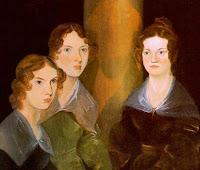Jane Eyre by Charlotte Brontë
Fun With Ed and Jane
The stage is set. A soft rendition of “We Are Family” is
playing in the background. Drum rolls, please! Now let’s give a big round of
applause for the brainy, bodacious, and brilliant Brontë sisters! Curtains! Enter
the literary trio: Charlotte, Emily, and Anne Brontë.
 This week I’m going to take a look at the works of these
remarkable sisters. The three Brontë sisters
were exceptional writers who churned out amazing classics in their short
lives. Tragically, all died before the
age of forty. We start with Charlotte, born in 1816. She was, in fact, a middle
child in a family of six siblings. At the
ages of ten and eleven respectively, her sisters Elizabeth and Maria died as a result of abysmal conditions at a boarding school.
This left Charlotte the eldest with brother Branwell, Emily, and little Anne
following behind her. When Anne was not quite two years old, their mother died
of cancer.
This week I’m going to take a look at the works of these
remarkable sisters. The three Brontë sisters
were exceptional writers who churned out amazing classics in their short
lives. Tragically, all died before the
age of forty. We start with Charlotte, born in 1816. She was, in fact, a middle
child in a family of six siblings. At the
ages of ten and eleven respectively, her sisters Elizabeth and Maria died as a result of abysmal conditions at a boarding school.
This left Charlotte the eldest with brother Branwell, Emily, and little Anne
following behind her. When Anne was not quite two years old, their mother died
of cancer.
All siblings were blessed with creative juices flowing
through their veins. Branwell proved to
have a knack for art and became a portrait painter. After Charlotte and Emily’s
plan to open a school failed, they, along with Anne tried their hand at writing
which had always been their hobby anyway.
It was an accidental discovery on Charlotte’s part that got the ball
rolling. Charlotte found Emily’s secret
poems she had written—ones she had not seen before. She was impressed. Soon after, Anne revealed that she had also
been writing on the sly. Charlotte thought, “What the hecketh, let’s publisheth
all our writings in one book. What have we got to lose?” The 1800s being a man’s
world and all, the clever sisters decided to use the male pseudonyms Currer,
Ellis, and Acton Bell, the first letters of their real names corresponding to
the masculine pen names. The book was published at their own expense and sadly
was not the runaway best seller they thought it might be. Two copies were sold (or
three depending on your source). Dismal either way. But the sisters were
nothing if not determined and decided to plow forward. In 1847 all three of the sisters published
their own masterpieces. Anne unveiled Agnes Grey, Emily debuted Wuthering Heights, and Charlotte gave
birth to Jane Eyre, which was the most
successful of the three.
Just as they were still celebrating their good fortune, tragedy
struck. Branwell, who had in the
meantime become an alcoholic and addicted to laudanum, succumbed to tuberculosis
in September of 1848. Just three months later Emily, too, passed away from the
same illness. And if that wasn't enough, five months after that Anne became
yet another victim of the dreaded disease. Branwell was thirty-one, Emily was thirty,
and Anne was just twenty-nine years old.
That left Charlotte the last woman standing. She valiantly carried
on and continued to write. She became a bit reclusive. Finally one man managed to win her over, and
in 1854 Charlotte married Arthur Bell Nicholls. At last she had found
happiness. And as a bonus helping of joy, Arthur and Charlotte were to
become parents! But Brontës’ lives were destined to be more tragic than a novel,
and nine months into her marriage, Charlotte died of complications from her
pregnancy (or tuberculosis, depending on which source you believe). She was thirty-eight years
old.
Jane Eyre by Charlotte Brontë is my favorite of the Brontë
sisters' books. This novel is the long, harsh account of an orphan girl who
grows up to become a governess and eventually finds love. Throughout her
challenging life, Jane overcomes as many obstacles as Wonder Woman deflects
bullets. First she is abused by the aunt who takes her in after her parents die.
Then she’s shoved off to Lowood, a school that puts boot camps to shame. Heat,
proper meals, and decent clothing are luxury items. So is dignity. Jane is
singled out and further humiliated in conditions that would garner lawsuits, or
at the very least a book deal, in this day and age. She deserves a
T-shirt that says “I Survived Lowood.” Finally, after eight arduous years
as a student and later a teacher, she sets out on her own as governess to Adèle
Varens, ward of the formidable Mr. Edward Rochester. She falls in love
with Mr. R., which is of course, totally inappropriate given her place in the
household as well as the fact that she’s kind of homely compared to his upscale
friends. Will they or won’t they get together—that’s the question. And I’m not
giving the answer. I can say, however, that you may find a surprise or
two along the way. This was definitely a memorable book, which I continue
to hold close to my heart many years after having read it. Go, Jane!
My future husband was becoming to me my whole world; and more than the world: almost my hope of heaven. He stood between me and every thought of religion, as an eclipse intervenes between man and the broad sun. I could not, in those days, see God for His creature: of whom I had made an idol.
Charlotte Brontë, Jane Eyre (1848; reprint, Pleasantville, NY: Reader’s Digest Association, Inc., 1984), 247.
Next up, Wuthering Heights—and it’s a doozy.
Happy reading!
Annette






Comments